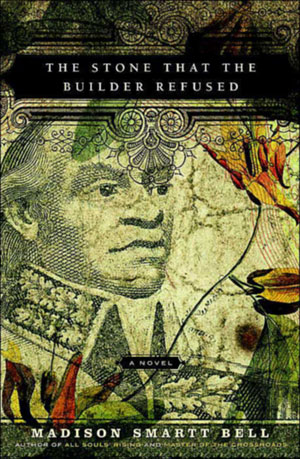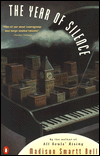NYS WRITERS INSTITUTE
HOME PAGE

MADISON SMARTT BELL
NYS Writers Institute Reading - November 16, 2004
4:15 p.m. Informal Seminar | Assembly Hall, Campus Center
8:00 p.m. Reading | Recital Hall, PAC, Uptown Campus
Literary critic Harold Bloom calls Madison Smartt Bell "as remarkable a historical novelist as we have in this country." Bell earned that assessment with his 1995 novel, "All Souls' Rising," the first in a trilogy of massive novels about the blood-soaked Haitian War of Independence (1791-1804). "All Souls' Rising" was a finalist for the National Book Award and the PEN/Faulkner Award, and received the Anisfield-Wolf award for the best book of the year dealing with matters of race. In 1996, "Granta" named Bell one of the "Best American Novelists Under Forty."
 Bell's second installment in the "Haitian trilogy," "Master of the Crossroads" (2000), follows the rise to power of fabled revolutionary and former slave, Toussaint L'Ouverture.
Bell's second installment in the "Haitian trilogy," "Master of the Crossroads" (2000), follows the rise to power of fabled revolutionary and former slave, Toussaint L'Ouverture.
"It's a brilliant performance, the work of an accomplished novelist of peculiar energy and courage.... One puts down 'Master of the Crossroads' with a visceral knowledge of what it felt like to wage war in Haiti at the turn of the 19th century." - James Parini, "New York Times Book Review"

 The third and final book in the "Haitian trilogy," "The Stone That the Builder Refused," will be published this November 2004. The publication of the new book, and Bell's reading at the Writers Institute, are timed to coincide with Haiti's Bicentennial (1804-2004).
The third and final book in the "Haitian trilogy," "The Stone That the Builder Refused," will be published this November 2004. The publication of the new book, and Bell's reading at the Writers Institute, are timed to coincide with Haiti's Bicentennial (1804-2004).
Born and raised in Tennessee, Bell is placed by many critics in the grand tradition of Southern American letters, despite the fact that much of his fiction is set in Haiti and New York City. His work is, however, frequently preoccupied with race relations between black and white, both past and present. Bell's fiction also comes in a wide variety of styles and sizes- dark intense short stories, monumental epics, and short picaresque novels. Writing about Bell's versatility in "Booklist," Donna Seamon said, "Bell has been called a postmodernist, a minimalist, a prose poet of aloneness, and the best writer of his generation."
 By the age of forty, Bell had published no fewer than nine critically acclaimed novels (at 47, he is currently the author of twelve). His early books include "The Washington Square Ensemble" (1983), "Waiting for the End of the World" (1985), "Straight Cut" (1986), "The Year of Silence" (1987), and "Soldier's Joy" (1989).
By the age of forty, Bell had published no fewer than nine critically acclaimed novels (at 47, he is currently the author of twelve). His early books include "The Washington Square Ensemble" (1983), "Waiting for the End of the World" (1985), "Straight Cut" (1986), "The Year of Silence" (1987), and "Soldier's Joy" (1989).
"Doctor Sleep" (1991), an intellectual thriller about hypnotism and insomnia, was made into a film in England in 2002, which received the "Grand Prix" at the Paris Film Festival. More recent novels include "Save Me, Joe Louis" (1993), the tale of two criminal drifters set in both New York City and the South; "Ten Indians" (1996), about a middle-aged white man who opens a Tae Kwon Do school in inner-city Baltimore; and "Anything Goes" (2002), the story of a mixed-race musician in a ragtag Tennessee bar band. The novel was released with a companion CD featuring 10 songs by the fictional band.
Bell's short stories have appeared in numerous literary publications, including the "Atlantic," "Harper's," "Ploughshares," "Southern Review," and the "Best American Short Stories." Bell is also the author of "Narrative Design: A Writer's Guide to Structure" (1997). Bell has taught since 1984 in the Creative Writing Program at Baltimore's Goucher College, where he is currently Professor of English, and Director of the Kratz Center for Creative Writing.
Previous Article:
Sunday Times Union Article
For additional information, contact the Writers Institute at 518-442-5620
or online at https://www.albany.edu/writers-inst.
